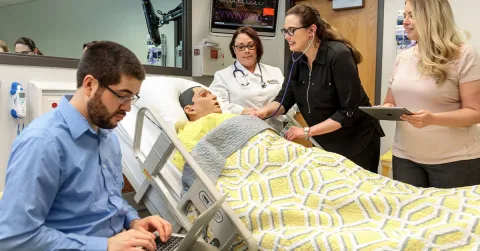
How to Impact the Future of Nursing as a Nurse Educator
Nurse educators play a vital role in shaping the future of nursing by preparing the next generation of nurses to provide compassionate, evidence-based care. As experienced clinicians and skilled… Read More

How to Become a School Counselor and Support Student Well-being
If you're ready to pursue your passion for helping students, now is an ideal time to begin your journey into school counseling. Read on to explore how school counselors support student well-being in… Read More

Transitioning from RN to NP: Benefits and tips
Take the next step in your professional life. Advance your career from RN to NP for greater autonomy, flexibility and earning potential through an MSN program. Read More

7 Ways Technology Is Impacting Nursing
Nurses at all levels who want to stay current and advance in their careers should deepen their understanding of the impact of technology on nursing and how the use of technology is expected to change… Read More

FNP vs. PMHNP: Differences Explained
Explore the differences between FNP vs. PMHNP nursing roles, and learn how the practices can be a key part of a health care facility’s care delivery approach. Read More

Therapeutic Interventions for PMHNPs
Want to help others improve their thinking and behavior? Consider becoming a psychiatric mental health nurse practitioner (PMHNP) and using therapeutic interventions Read More

How PMHNPs Bridge the Gap in Medical and Mental Healthcare
Nurse practitioners (NPs) are instrumental in helping health care facilities provide high-quality care to patients that can lead to optimum patient outcomes. However, their work isn’t confined to… Read More

Tips for Making a Career Change to Counseling
Before making a career change to counseling, identifying the hard and soft skills the job requires and performing a self-assessment are important. While this may seem intimidating, many professionals… Read More

Online Nursing at a Glance Webinar: Obtaining your Nursing Degree
This webinar, presented by Amna Abid, a senior program specialist in admissions with over 15 years of experience working with registered nurses, provides an overview of Walsh University's nursing… Read More
